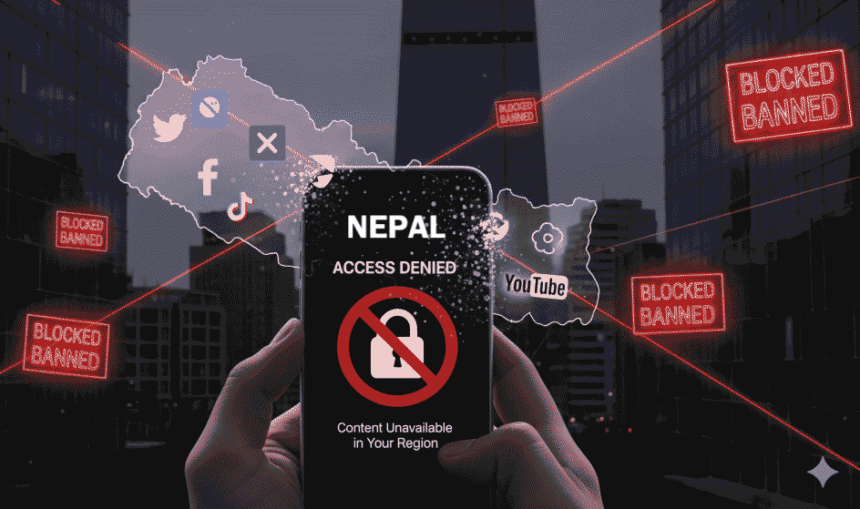KATHMANDU— In a surprising move, Nepal’s government has blocked access to 26 popular social media and messaging platforms. The list includes Facebook, Instagram, YouTube, X, WhatsApp, Reddit, LinkedIn, Snapchat, and Discord.
The ban began at midnight on September 5, 2025. The Nepal Telecommunications Authority (NTA) enforced the action after orders from the Ministry of Communications and Information Technology (MoCIT).
The ban has sparked widespread concern in a country where more than 90 percent of people use the internet. Many worry about censorship, freedom of speech, and the financial effect on a growing digital economy. Here’s a look at which platforms are blocked, the reasons behind the decision, and how Nepal’s people and businesses are reacting.
Blocked Platforms
The new rules bar access to 26 platforms that are not registered with the authorities in Nepal. The government’s list includes:
Meta apps: Facebook, Instagram, WhatsApp, Messenger, Threads
Google’s YouTube
X Corp’s X (formerly Twitter)
Other big names: LinkedIn, Reddit, Snapchat, Discord, Pinterest, Signal, WeChat, Quora, Tumblr, Clubhouse, Rumble, VK, Line, IMO, Zalo, Soul, and Hamro Patro
At the moment, only seven platforms are still available: TikTok, Viber, Witk, Nimbuzz, and Popo Live (all already registered with the MoCIT), plus Telegram and Global Diary, which are under review. The clear divide between platforms allowed and those blocked reflects the government’s strict approach to its new rule that all platforms must be registered.
Why Did Nepal Decide to Ban These Platforms?
The ban comes from the 2023 Directive on Regulating the Use of Social Media, supported by a Supreme Court ruling on August 17, 2025, linked to a contempt of court case. According to this order, every social media company, whether local or global, must register with the MoCIT.
Each must appoint people based in Nepal to handle complaints and legal compliance, and all must operate according to local laws. The rules were set to stop the spread of false information, hate speech, and online scams. The authorities gave companies until September 4 to comply, offering a week’s notice after the order was issued on August 28. When most did not register, the government ordered an immediate block.
Communications Minister Prithvi Subba Gurung said, “We gave them ample time and kept asking for compliance, but they refused. We had no choice but to block them in Nepal.”
Officials argue that many of these platforms allow fake accounts, spread rumours, and help online crime, which they believe threatens social unity. With eight out of ten internet users in Nepal relying on Facebook and YouTube, the ban has a wide reach. A proposed social media law still under review in parliament could soon introduce fines and even jail for sharing “anti-national” content, raising further worries about government overreach.
This is not Nepal’s first attempt to control social media. In late 2023, the government banned TikTok, saying it harmed social peace, but allowed it back in August 2024 when ByteDance completed registration.
Telegram also faced blocking in July 2024 over fraud claims, but has since applied for review. These incidents show that while blocks may be lifted once companies comply, the scale of the current ban is far larger than anything before.
How Are People in Nepal Reacting?
The ban has caused a strong public reaction. Many expressed anger and disbelief, sharing their thoughts while platforms like X and Facebook were still accessible. Posts with phrases like “This feels like cutting off our voice” were common, and hashtags such as #NepalBansSocialMedia and #DigitalFreedom trended for a short time before access disappeared. Some accused officials of trying to silence public criticism.
Many in Nepal are now turning to VPNs and DNS apps, driving up downloads in app stores. By the evening of September 4, Nepali users rushed to install Viber, causing delays on Google’s Play Store.
Experts remind people that free VPNs can put their data at risk, a threat for families and young Nepalis, especially, with over seven million Nepali youth abroad depending on WhatsApp and Messenger to keep in touch.
Businesses have also been hit hard. Small firms and content creators used Facebook and other platforms to reach customers and grow their brands. Facebook’s new monetization programme in Nepal just launched this year, giving local creators a fresh way to earn income online.
Now, all that progress is on hold. “This is a disaster for small businesses,” said Anil Shrestha, a Kathmandu shop owner. “Facebook was our main way to advertise cheaply. Now we don’t know what to do next.” Telecom estimates also show the ban may affect internet use across the country, with social media making up more than 80 percent of Nepal’s 10 Tbps domestic internet use.
Criticism and Wider Context
Groups supporting press rights and free speech have spoken out against the ban. The Committee to Protect Journalists warned it could block journalists from doing their jobs and keep people from getting proper news.
The Federation of Nepalese Journalists called it a direct threat to Nepalis’ right to information. Raman Jit Singh Chima from Access Now compared Nepal’s new policies to those in China, saying these steps damage hopes for democracy in the country.
Skeptics also point to practical problems. Registering in Nepal may not be worthwhile for global giants, given Nepal’s small market and low advertising income. Meta (owner of Facebook and Instagram) has pushed back, with company leaders saying Nepal’s requests (such as deleting content on government orders) do not fit their rules.
YouTube representatives noted that “Nepal is not a priority” as ad revenues there are low, making it unlikely the company will set up shop locally.
Nepal’s actions are consistent with a growing trend around the world as countries pass new rules for big tech. Similar regulations have appeared in India, the EU, Brazil, and Australia. Still, Nepal’s full-scale block stands out for its severity and the risks it poses to online speech and business.
What Comes Next?
Officials at the MoCIT say platforms can return if they register. Minister Gurung stresses that talks continue with tech companies, and reports suggest Meta contacted Nepali officials on September 4 about the paperwork. For now, the standoff continues with no clear outcome.
Nepal’s online community faces major changes and new limits. Many are looking for other tools to connect, while businesses look for new marketing channels. The ban has opened up big questions about how to balance public control and free speech. As the situation unfolds, millions in Nepal wait to see when, or if, the social media silence will end.















